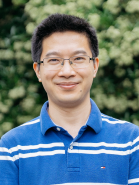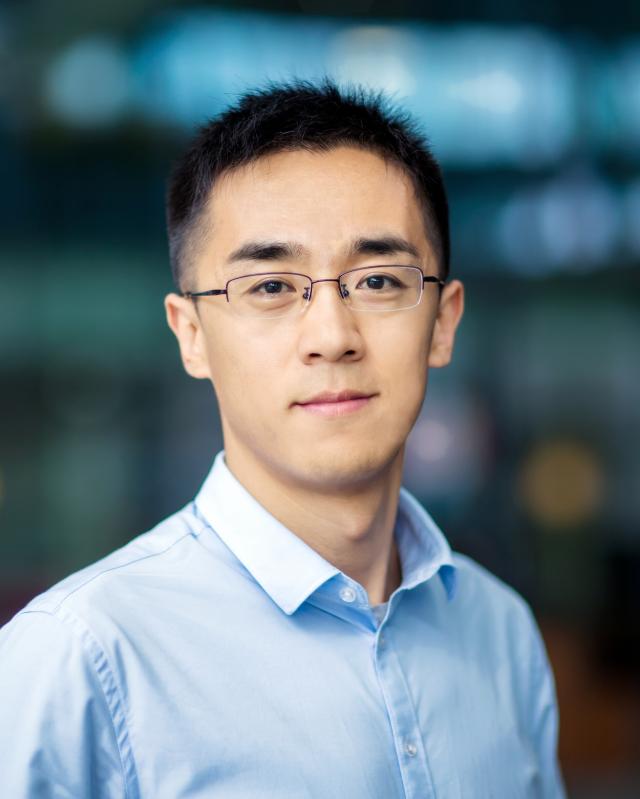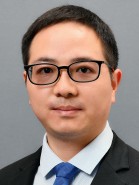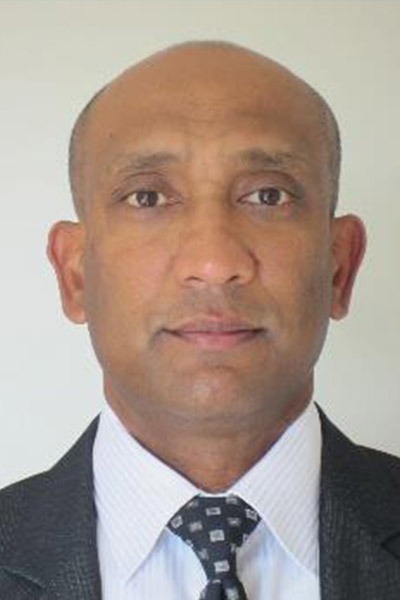

Prof. Zhiguo Shi
IET Fellow
Zhejiang University, China
Biography: Prof. Zhiguo Shi received the B.S. and Ph.D. degrees in electronic engineering from Zhejiang University, Hangzhou, China, in 2001 and 2006, respectively. He is currently a full professor and vice dean in College of Information Science and Electronic Engineering, Zhejiang University. He is the Executive Deputy Director of the Zhejiang Province Key Laboratory of Collaborative Sensing and Autonomous Unmanned Systems. He is awarded as the Qiushi Distinguished Scholar in Zhejiang University. From 2011 to 2013, he visited the Broadband Communications Research Group, University of Waterloo, Waterloo, ON, Canada. His current research interests include theory and techniques in array signal processing, tensor-based signal processing, and AI-based signal processing, especially in the application of Intelligent surveillance of low-altitude aircraft, localization and identification of IoT devices, and space attitude simulation control. He was Highly Cited Chinese Researchers during 2020~2023, and received the First Prize of Natural Science Award of Zhejiang Province (2022), The First Prize of Scientific and Technological Innovation of China Association for the Promotion of Science and Technology Industrialization (2022), First Prize of Technological Invention of Chinese Society of Artificial Intelligence (2020), etc. He is currently a Distinguished Lecturer in IEEE VTS and APSIPA, an member of the Sensor Array and Multichannel (SAM) Technical Committee of the IEEE Signal Processing Society and the Digital Signal Processing (DSP) Technical Committee of the IEEE Circuits and Systems Society.
Speech Title: MSE lower bounds for radar parameter estimation From Cramer-Rao to Ziv-Zakai
Abstract: The accurate estimation of different localization parameters, such as directions-of-arrival and time delay of echo signals, is one of the basic functions of radar systems. In these parameter estimation problems, lower bounds on mean squared error (MSE), e.g., Cramér-Rao bound (CRB), have become an important tool for evaluating the performance for estimation algorithms. However, due to its locality, Cramér-Rao bound is difficult to maintain tightness under non-ideal observation conditions such as low signal-to-noise ratio (SNR) and limited sampling snapshots, and therefore cannot provide a tight error limit for parameter estimation algorithms. In contrast, Ziv-Zakai bound has been proven to be a globally tight lower bound for MSE performance, and due to its complete mathematical analysis framework and good interpretability, it has received more attention in recent years. This report will systematically introduce the latest theoretical research progress of our research team on the Ziv-Zakai bound in typical target parameter estimation problems such as time delay estimation, multi-target one-dimensional and two-dimensional direction-of-arrival estimation on the basis of a comprehensive review of the research in the field of lower bound on the MSE, and give a closed-form expression of the Ziv-Zakai bound with global tightness for the related problems.

Prof. Xuwei Xue
Beijing University of Posts and Telecommunications, China
Biography: Prof. Xuwei Xue is the professor and doctoral supervisor at the State Key Laboratory of Information Photonics and Optical Communications, Beijing University of Posts and Telecommunications. His research focuses on ultrafast all-optical switching technologies for data centers and high-performance computing, tunable silicon photonic device design, and high-precision time-frequency synchronization technologies. He has led and participated in over ten national-level projects and numerous university-industry collaborative projects. In the past five years, he has published over ninety SCI/EI indexed papers, including in Nature Communications, and was invited to write four review papers for journals such as IEEE Journal of Lightwave Technology and IEEE Journal of Optical Communications and Networking. He has been a keynote speaker fifteen times at international academic conferences like ECOC2020, received the Best Paper (Student) Award at conferences such as OFC2019, and has eight PDP papers. He was awarded the IEEE ACP Young Scientist Award in 2022, the First Prize for Scientific and Technological Progress by The Chinese Institute of Electronics in 2022, and the First Prize for Cooperative Innovation Achievement by the China Industry-University-Research Institute Collaboration Association in 2022.
Speech Title: Hybrid Optical-Electrical Switching Network Based on AWGR
Abstract: Data centers and high-performance computing, serving as the physical carriers for the operation of information systems in various industries, are indispensable key infrastructures for societal operation. They also constitute an important part of China's national strategies for "east data, west computing" project and "New Infrastructure Construction." With the popularization and application of new technologies such as 5G, cloud computing and artificial intelligence, the demand for computing power is growing rapidly. In recent years, significant progress has been made in the development and application of large models represented by ChatGPT, further driving the demand for computing power. With the rapid development of data centers and high-performance computing centers, switching technology also needs to be upgraded and evolved to meet the requirements for high bandwidth, low latency, and low energy consumption in data transmission. Compared with traditional electrical switching technology, optical switching offers many advantages, including large bandwidth, low loss, strong anti-interference ability, and high-speed parallel transmission without crosstalk, making optical switching networks an important technological direction for communication development. This report will discuss hybrid optical-electrical switching networks based on AWGR (Arrayed Waveguide Grating Router), covering aspects such as tunable reconfigurable devices, low-latency flexible scheduling, and interconnect architecture design. It will detail the design and fabrication of flexible tunable optoelectronic integrated devices, nanosecond-level multi-dimensional optical interconnects, and real-time resource scheduling as key technologies.

ZJU Young Professor Lei Liu
Zhejiang University, China
Biography: Lei Liu received the Ph.D. degree in Communication and Information Systems from Xidian University in 2017. From 2014 to 2016, he was an exchange Ph.D. student with Nanyang Technological University (NTU), Singapore. From 2016 to 2017, he was a Post-Doctoral Research Fellow with the Singapore University of Technology and Design (SUTD), Singapore. From 2017 to 2019, he was a Research Fellow with the City University of Hong Kong (CityU), Hong Kong. From 2019 to 2023, he was an Assistant Professor with the Japan Advanced Institute of Science and Technology (JAIST), Japan. He is currently a Tenure-Track ZJU Young Professor with Zhejiang University. He served as the Publications Co-Chair of the 2021 IEEE Information Theory Workshop and Co-Chair of the Information Theory and Coding Session at the 2023 International Conference on Wireless Communications and Signal Processing. He received the Young Star Award (only 2 recipients) and the Best Poster Award at the 30th Chinese Institute of Electronics Conference on Information Theory (CIEIT) in 2023. He was an Exemplary Reviewer (fewer than 2%) of IEEE Transactions on Communications, 2020. He is a senior member of IEEE and the China Institute of Communications (CIC). From 2023 to 2026, he is supported by the Excellent Young Scientists Program (Overseas) of National Natural Science Foundation of China (NSFC) and Excellent Young Scholar Talent Program of Huawei. His current research interests include message passing, statistical signal processing, wireless communications, modern channel coding, and information theory.
Speech Title: Interleave Frequency Division Multiplexing (IFDM)
Abstract: This talk introduces interleave frequency division multiplexing (IFDM) for multicarrier modulation in static multipath and mobile time-varying channels, which outperforms orthogonal frequency division multiplexing (OFDM), orthogonal time frequency space (OTFS), and affine frequency division multiplexing (AFDM) by considering practical advanced detectors. The fundamental principle underlying existing modulation techniques is to establish sparse equivalent channel matrices in order to facilitate the design of low-complexity detection algorithms for signal recovery, making a trade-off between performance and implementation complexity. In contrast, the proposed IFDM establishes an equivalent fully dense and right-unitarily invariant channel matrix with the goal of achieving channel capacity, ensuring that the signals undergo sufficient statistical channel fading. Meanwhile, a low-complexity and replica maximum a posteriori (MAP)-optimal cross-domain memory approximate message passing (CD-MAMP) detector is proposed for IFDM by exploiting the sparsity of the time-domain channel and the unitary invariance in interleave-frequency-domain channel, outperforming OFDM, OTFS, and AFDM with state-of-the-art high-complexity orthogonal approximate message passing detectors.

Prof. Udaya Madawala
IEEE Fellow
University of Auckland, New Zealand
Biography: Prof. Udaya K. Madawala graduated with a B.Sc. (Electrical Engineering) (Hons) degree from The University of Moratuwa, Sri Lanka, and received his PhD (Power Electronics) from The University of Auckland, New Zealand as a Commonwealth Doctoral Scholar. At the completion of his PhD, he was employed by Fisher & Paykel Ltd, New Zealand, as a Research and Development Engineer to develop new technologies for motor drives. At present as a Full Professor in the Department of Electrical and Computer Engineering at University of Auckland, New Zealand, he leads a large group of researchers focusing on a number of power electronics projects that are related to energy and wireless EV charging systems for V2X applications. Udaya is a Fellow of the IEEE and was a Distinguished Lecturer of the IEEE Power Electronic Society (PELS), and has both industry and research experience in the fields of power electronics and energy. He has served both the IEEE Power Electronics and Industrial Electronics Societies in numerous roles, relating to editorial, advisory, conference, technical committees and chapter activities. He was the General Chair of the 2nd IEEE Southern Power Electronics Conference (SPEC)- 2016, held in New Zealand, and is also the Chair of SPEC Steering Committee. Udaya, who has over 300 journal and conference publications, holds a number of patents related to wireless power transfer (WPT) and power converters, and is a consultant to industry.
Speech Title: EVs : Charging & Challenges
Abstract: Electric vehicles (EVs) reduce air pollution, and are ideal for sustainable living. However, the high uptake of EVs also presents a number of technical challenges. These include the means of charging, development of charging systems, standards, driving range, battery, demand for increased levels of EV charging infrastructure & issues associated with charging infrastructure planning, and the impacts on grid due to large-scale charging demands that compromise the stable and economic operation of the power grid. This seminar discusses these challenges, highlighting the technical problems, and presents the solutions that have been proposed. The seminar also gives an introduction to wireless EV charging.